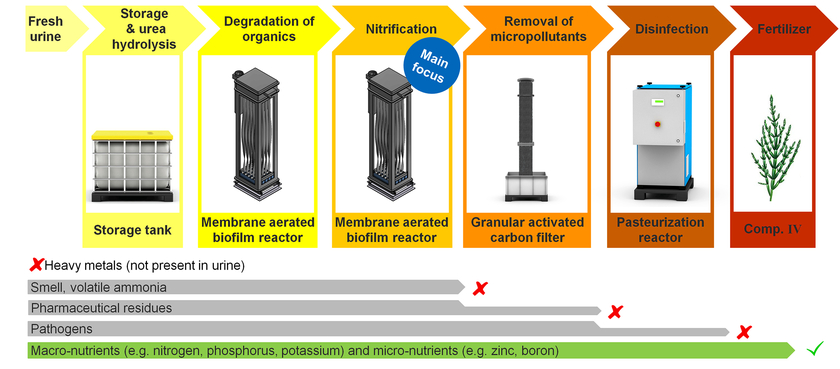Department Process Engineering
Melissa Space Research Program

MELiSSA stands for “Micro Ecological Life Support System Alternative” and is a space research program, aiming to develop a bioregenerative life support system for long-term space missions and space habitations for example on Mars.
The MELiSSA project is managed by the European Space Agency and started 30 years ago on a collaborative development program between 14 partners and a large number of supporting sub-contractors and international partners.
Nutrient recovery from urine in space
In the MELiSSA loop, urine is the main target for nitrogen recovery. However, urine has to be converted into a biologically stable solution, before it can be used as a fertilizer. This is what an Eawag PhD project is working on.
A urine treatment chain for space application is proposed based on Eawag’s technology and MELiSSA’s experience. The treatment chain consists of five treatment units (Figure): (1) In the storage tank the urea, which is the main Nitrogen source, is hydrolysed. (2) The removal of the organics takes place in a membrane aerated biofilm reactor (MABR). (3) In a second MABR the urine is nitrified. No base is added, therefore only half of the ammonia is nitrified. (4) Micropollutants are adsorbed in a granular actived carbon filter. (5) In the final step, the urine is disinfected and can be used for the plant compartment of the MELiSSA loop
Increase process stability
For space application, a robust, controlled and reliable operation as well as high level of predictability is required. Therefore, the main goal of the on-going research at Eawag is to increase the process stability of the urine treatment and especially of the nitrification. First, the nitrification process is modelled to predict possible process failures qualitatively. Subsequently, two different approaches are tested to increase the process stability, either using model based operating strategies optimization or an additional electrochemical unit.

